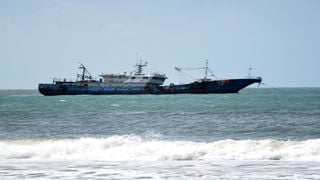
Chinese fishing boats tied to fishing trawlers at Malindi Beach in Kilifi County on July 19, 2021.
Tana River
Premium
Trawler fishing depleting stocks, breeds in Tana River
The Indian Ocean and the River Tana have long been centres of economic activity in Tana River County.
For decades, people in the Kipini area have been feeding and educating their children by fishing in the sea.
But the frontier is slowly staggering to its deathbed with massive depletion of fish breeds and their breeding areas as a result of trawler fishing and the use of illegal nets.
“We are losing a lot through these contracted fishermen. They are killing the blue economy down here and also ruining business for us,” lamented lobster dealer Abu Said.
The use of trawler ships in harvesting takes away both mature fish and bycatch, in disregard of fishing guidelines per the licence issued to the fishermen.
The waste is massive, as the ship only takes home mature fish that is likely to fetch good money in the market, and as a result, most of the dead bycatch is thrown back into the sea.
The fishermen in Kipini have no choice but to go for the “waste” in order to sustain their business, as the catch potential continues to fall.
Fish waste
“We collect more than 800kg of fish waste whenever the ship leaves the sea. They sell it to us at a cheaper price and if we can’t buy it, they dump it in the ocean,” said Hassan Bwana.
What worries residents is that they have no option but to watch as ship owners boast about the protection they get from the high and mighty in the State department of fisheries.
The officials observe the massive waste and destruction of the fish industry in Kipini without saying a word, and at times, resident fishermen say officials in Malindi who happen to be in the company of the ships collect the money for the fish waste the locals purchase.
“We have our fisheries officers here, but they can’t do anything because their bosses are the ones coordinating the activities in the ships, they have been rendered powerless,” Mr Bwana said.
In early April, Tana River fisheries officers in collaboration with Kenya Wildlife Service rangers impounded a ship with tens of kilograms of bycatch consisting of young fish and baby sharks.

Kipini Beach Management Unit Secretary Twaha Mukhdhar (right) shows a turtle injured by trawling ships.
In their scaled-up patrols, KWS officials and Kipini Beach Management Unit members found two decomposing dolphins and several turtles on Shekiko Island.
The captain was arraigned and later released on Sh20,000 cash bail.
The Italian owner of the ship would later dismiss allegations about bycatch, saying the Tana River department of fisheries were blackmailing him after they failed to extort him.
A disgruntled senior officer told Nation.Africa, “Those are the owners of the land, what more can we do”?
It is no doubt that fish trawling has depleted the population of lobsters in the sea, with fishermen saying their catches have declined by more than 60 percent from a year ago.
Jumbo prawns
The population of jumbo prawns has also greatly declined, with the Kipini Beach Management Unit Ecosystem secretary Twaha Muhdhar saying if urgent action is not taken, there will be no prawns to harvest along the 76km Kipini waters.
“You can imagine from harvesting 800kg of prawns every week, right now we can barely achieve 400kg,” he said.
Though trawler fishermen are licensed by the government, he said, they are working beyond their permit and destroying the habitat.
He said trawlers are still fishing at night despite concerns about the dangers of doing so and numerous reports and evidence shared with officials.
The ships have stretched their gadgets in Ungwana Bay, mainly known as a breeding area for rare fish species.

Mr Abu Said, a fisherman displays lobsters obtained from a Trawler ship in Kipini, Tana River County.
“They know very well that they are supposed to fish beyond five nautical miles but have chosen to disregard guidelines. They are hurting young marine life and destroying rearing grounds in shallow waters,’’ Mr Muhdhar said.
Enjoy protection
Environmentalist Awadh Mbarak said the ship operators do not worry about the consequences of their actions because they enjoy protection from senior fisheries officials.
Fishermen and activists, he said, had channelled several complaints supported with credible evidence regarding trawler fishing in Kipini waters since 2016 but nothing has been done.
“We have been on high alert, but our efforts have been futile. We have written letters and even sought court injunctions against the ships, but when you wake up, you see them in the sea,” he said.
Trawler fishing makes about 900kg of waste per week. Illegal fishing and the use of banned gear create another 300kg of waste, said Tana River Director of Fisheries Evans Nyarango.
Whereas they have been able to control local fishermen with illegal fishing gear, he said, the biggest challenge lies with trawler ships.

Fishermen dock their boat at Kipini in Tana River County.
“We have confiscated a lot of illegal fishing gear. Our challenge at the moment is the ships that also have illegal fishing gear apart from practicing illegal fishing,” he said.
He noted that trawling endangers rare fish species like saw sharks, dugong and lobster, and breeding grounds for prawns.
His appealed for better enforcement of rules in the Kipini waters to ensure that trawler ships comply with regulations.
This story is part of a Nation.Africa reporting series on the state of the fishing sector at the Coast region. Also read:





